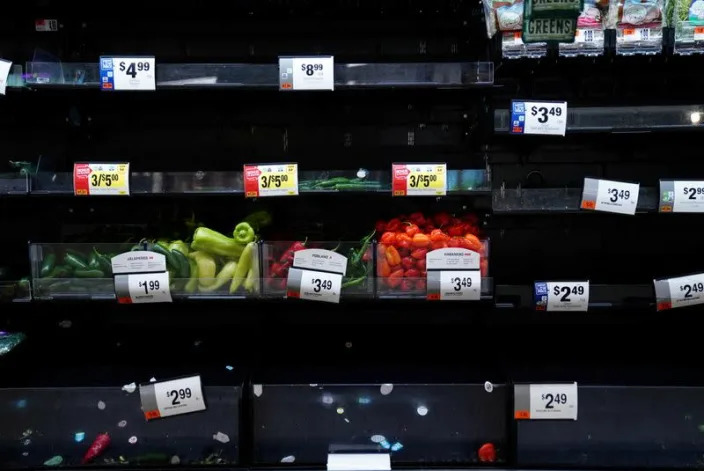 T.H.E.M.
¨We believe in the judgment; we believe this first judgment will take place as God revealed, in America...¨
T.H.E.M.
¨We believe in the judgment; we believe this first judgment will take place as God revealed, in America...¨
 T.H.E.M.
¨We believe in justice for all, whether in God or not; we believe as others, that we are due equal justice as human beings.¨
T.H.E.M.
¨We believe in justice for all, whether in God or not; we believe as others, that we are due equal justice as human beings.¨
U.S. grocery shortages deepen as pandemic dries supplies

Siddharth Cavale and Christopher Walljasper
By Siddharth Cavale and Christopher Walljasper
(Reuters) – High demand for groceries combined with soaring freight costs and Omicron-related labor shortages are creating a new round of backlogs at processed food and fresh produce companies, leading to empty supermarket shelves at major retailers across the United States.
Growers of perishable produce across the West Coast are paying nearly triple pre-pandemic trucking rates to ship things like lettuce and berries before they spoil. Shay Myers, CEO of Owyhee Produce, which grows onions, watermelons and asparagus along the border of Idaho and Oregon, said he has been holding off shipping onions to retail distributors until freight costs go down.
Myers said transportation disruptions in the last three weeks, caused by a lack of truck drivers and recent highway-blocking storms, have led to a doubling of freight costs for fruit and vegetable producers, on top of already-elevated pandemic prices. “We typically will ship, East Coast to West Coast – we used to do it for about $7,000,” he said. “Today it’s somewhere between $18,000 and $22,000.”
Birds Eye frozen vegetables maker Conagra Brands’ CEO Sean Connolly told investors last week that supplies from its U.S. plants could be constrained for at least the next month due to Omicron-related absences.
Earlier this week, Albertsons CEO Vivek Sankaran said he expects the supermarket chain to confront more supply chain challenges over the next four to six weeks as Omicron has put a dent in its efforts to plug supply chain gaps.
Shoppers on social media complained of empty pasta and meat aisles at some Walmart stores; a Meijer store in Indianapolis was swept bare of chicken; a Publix in Palm Beach, Florida was out of bath tissue and home hygiene products while Costco reinstated purchase limits on toilet paper at some stores in Washington state.
The situation is not expected to abate for at least a few more weeks, Katie Denis, vice president of communications and research at the Consumer Brands Association said, blaming the shortages on a scarcity of labor……Story continues
Click here for reuse options!Copyright 2022 Hiram's 1555 Blog
